Clapp Weekly: Tariff unease, Ethereum as DEX leader, GameStop's buying power

Price dynamics
BTC price
Tariff uncertainty weighs on Bitcoin as investment giants like JPMorgan and Goldman Sachs pencil in higher odds of a US recession. Capital is migrating to safer assets like gold, impacting crypto prices as the 'Liberation Day' tariffs kick in.
BTC slipped from $88k last Wednesday, March 26, and gradually descended to $82,237.62 by the onset of the weekend. After an uptick to $83.4k, it dipped again on Monday, March 31, hitting a seven-day low of $81,488.96. Yesterday's climb to $85,311.29 did not hold.
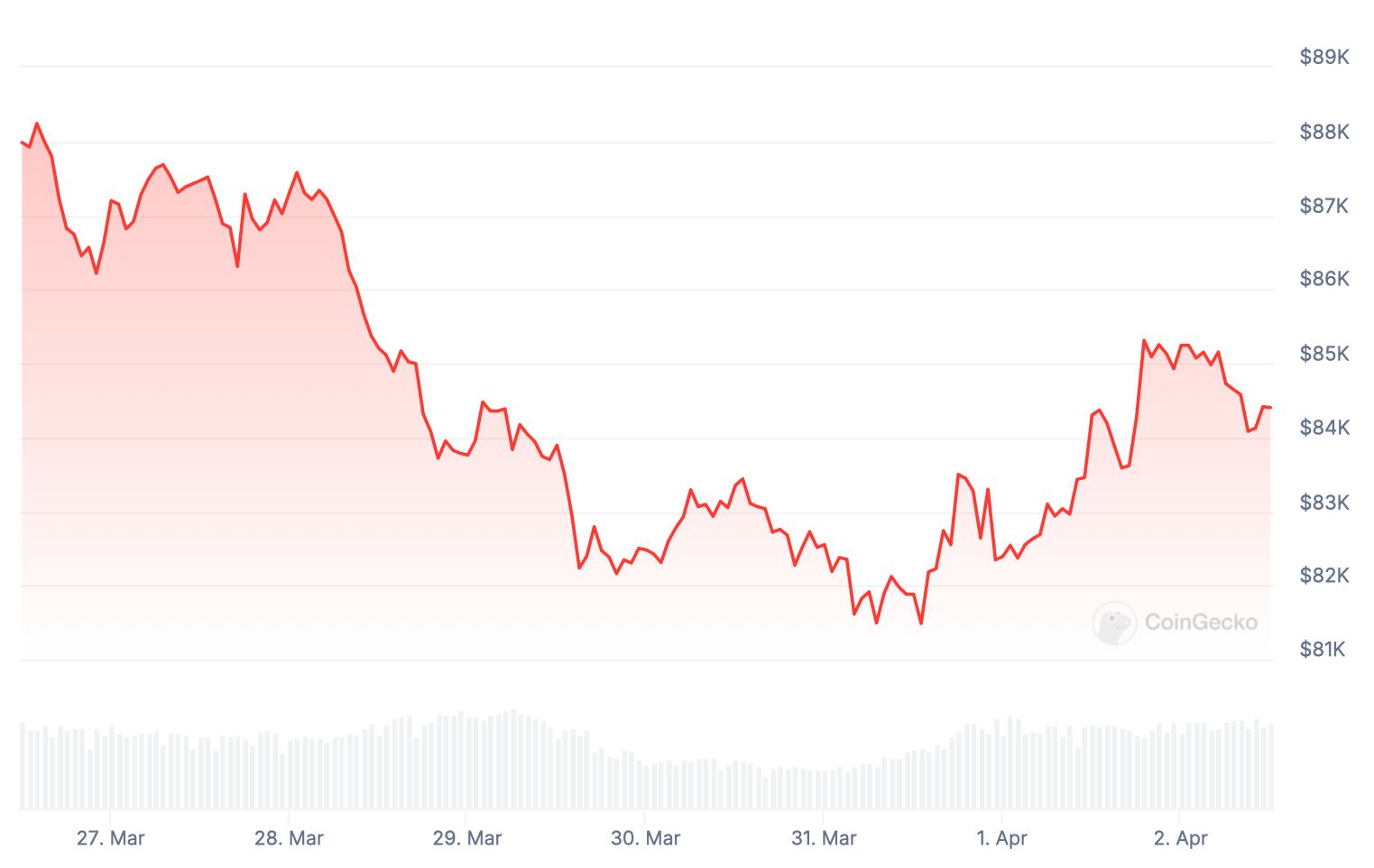
Changing hands at $84,053.44, BTC is up 1.2% over 24 hours but down 4.0% over 7 days.
ETH price
Ether has pumped following last week's downtrend fueled by macro tension. Its short-term future depends on Bitcoin’s stability above the $85k mark and any delays in implementing the Pectra upgrade, postponed twice already.
The ETH price mirrored BTC, losing its grip on $2k a week ago and slipping steadily. It teetered around $1.8K through the weekend, hit $1,784.07 on Monday, March 31, climbed to $1,921.06 yesterday, and retreated.
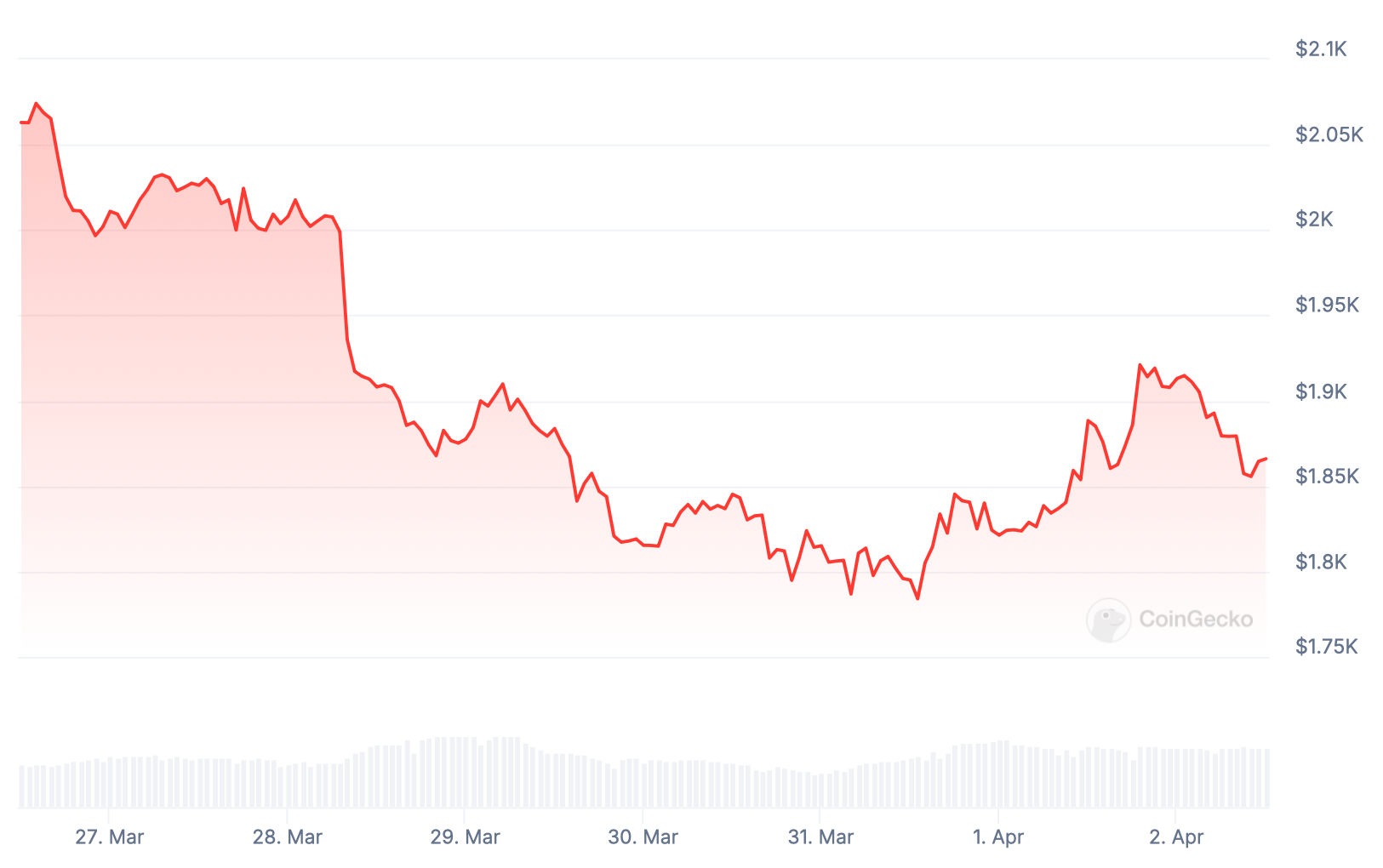
At press time, ETH is trading at $1,858.88, up 0.8% over 24 hours but down 9.8% over the past week.
Seven-day altcoin dynamics
Anxiety over Trump's trade war amid a flurry of US economic and jobs data have cast a shadow over crypto. The new tariffs will take effect immediately after their official announcement (4 PM ET today), affecting up to 15 key US trading partners.
A risk-off mood gripped broader markets, with investors flocking to gold. The S&P 500 lost 3% last week, its worst drop since September 2023. However, a rebound on April Fool's Day reflected “renewed optimism” — the tariff concerns had been "fully absorbed," according to Kronos Research analyst Dominick John.
Dogecoin (DOGE) and Cardano (ADA) surged, while multiple altcoins tumbled due to Binance’s update of leverage and margin tiers. The change triggered some massive Act I The AI Prophecy (ACT) whale liquidations, with the token price plunging 58% in less than an hour. DeXe (DEXE) shed 30% and dForce (DF) lost almost 20% within minutes.
Winners & losers
EOS (+36.0%) surged past a $1 billion market cap, fueled by hype around its upcoming rebranding to Vaulta and a 17% staking yield announcement. TON (+9.6%) also gained traction, supported by real-world adoption, including Elon Musk’s Grok chatbot boosting visibility.
The gold-pegged XAUT (+3.5%) also defied the broader bearish trend. Investors sought digital safe havens, with gold prices peaking amid tariff and inflation concerns.
On the losing side, IP (-34.3%) continued its free fall despite recent Telegram integration, as excitement around its Mainnet launch faded and miner activity declined. JUP (-28.8%) plummeted on backlash against Solana-based Jupiter Exchange, with community criticism over executive decisions sparking FUD, mismanagement claims, and valuation doubts.
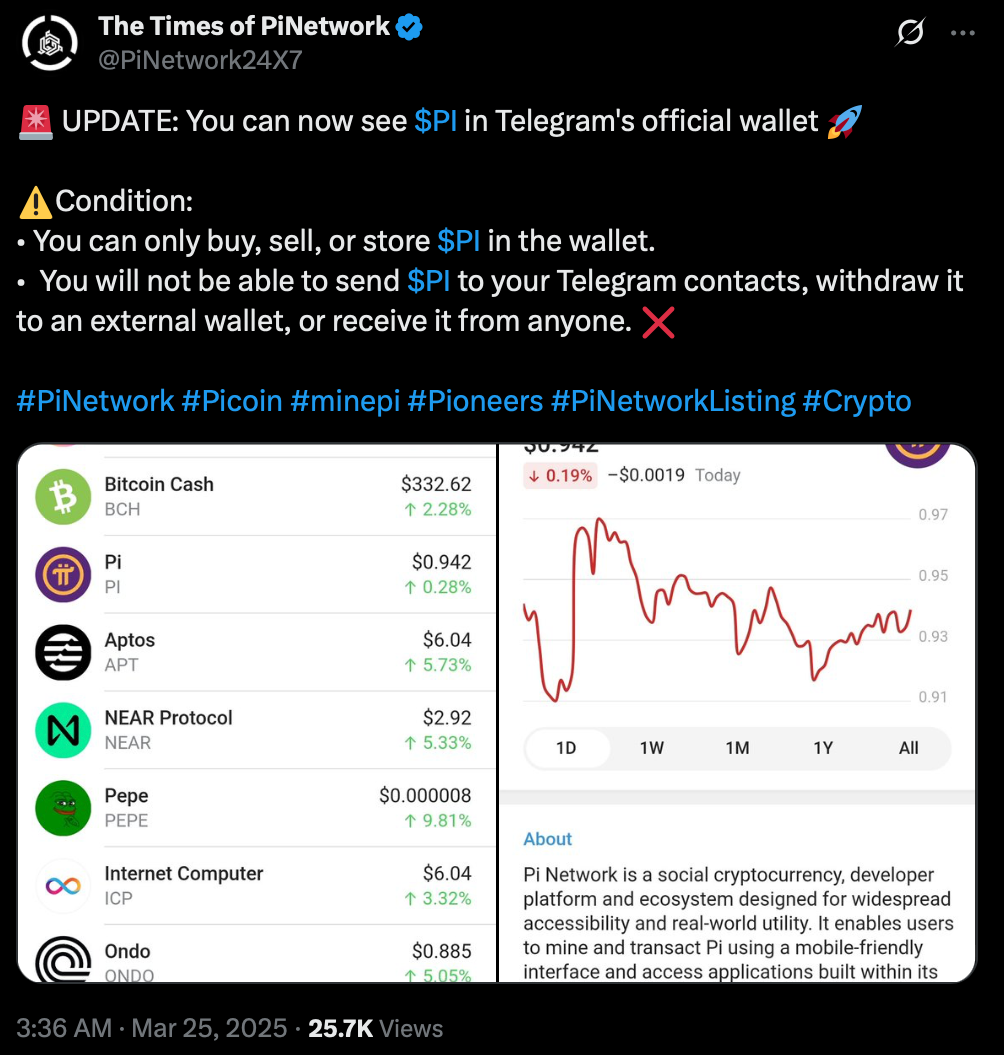
MOVE (-28.5%) also dropped after an initial rally driven by a $38 million buyback announcement. The plunge accelerated when a $7.7 million token transfer to Binance raised sell-off fears.
Cryptocurrency news
Ethereum regains top DEX chain spot, overtaking Solana
In March 2025, Ethereum reclaimed supremacy, flipping Solana in decentralized exchange (DEX) trading volume for the first time since September. Despite a broader crypto market plunge, Ethereum-based DEXes recorded $64.6 billion, outpacing Solana’s $52.6 billion by 22%.
The shift came as bearish sentiment, particularly in the meme coin sector, eroded activity on Solana-based platforms like Raydium and Pump.fun. The former, once a meme coin trading hotspot, saw daily volumes contract from January's peak of $13 billion to under $1 billion in March. Uniswap accounted for most of Ethereum’s volume dominance, contributing over $30 billion.
Interestingly, despite the outperformance in DEX activity, native token ether (ETH) fell 18% in March — more than Solana’s SOL, which lost 15.8%. Analysts cite inflationary tokenomics and the rising use of Layer 2 solutions, which may be diverting activity away from the main chain.
Some analysts expect the resurgence to extend into the second quarter, citing the upcoming Pectra upgrade, designed to boost user adoption and trading activity. It has been successfully deployed on the Holesky testnet.
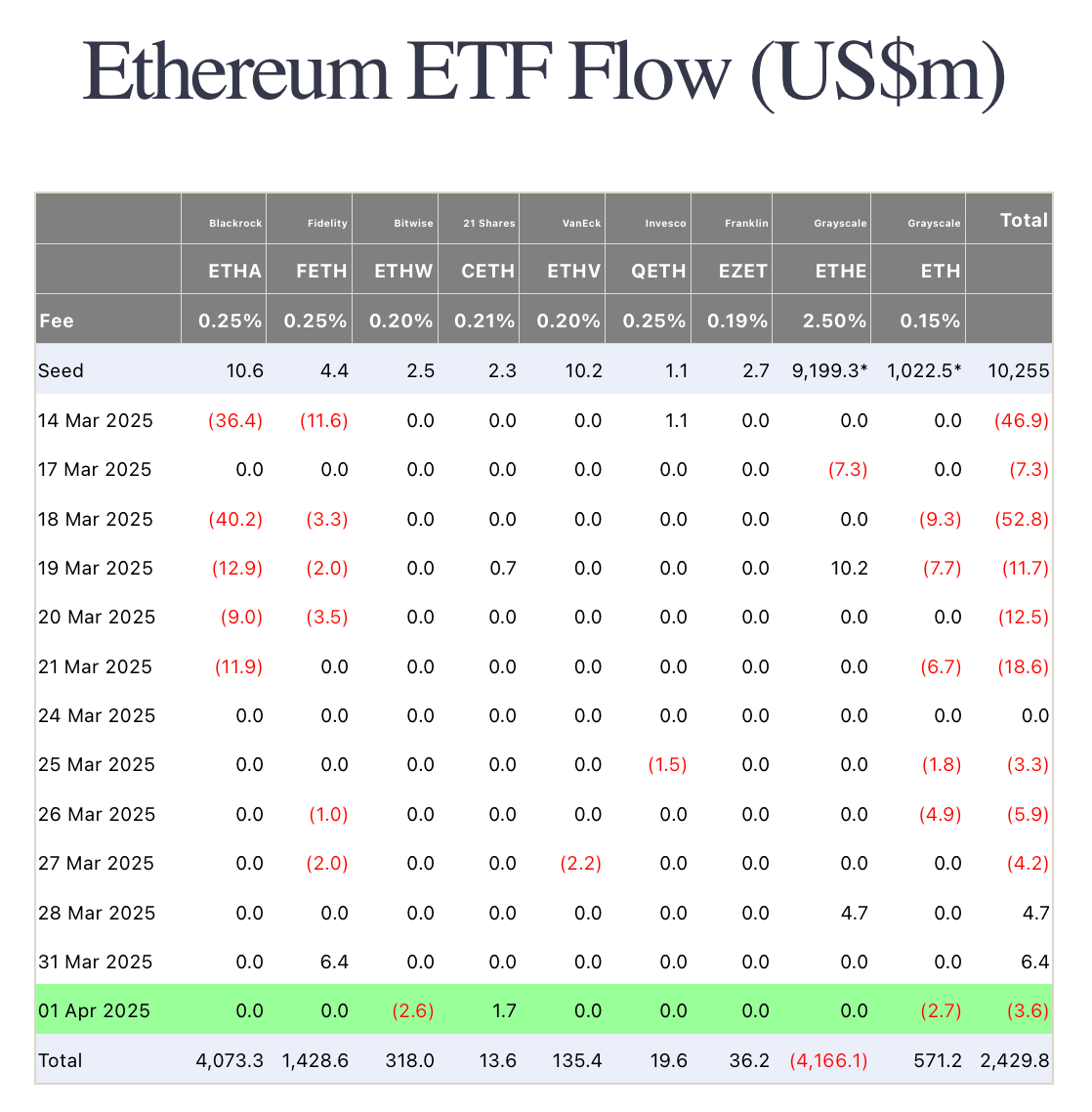
Meanwhile, US spot ether ETFs have also added to the positive momentum and confidence. On Monday, March 31, the products saw net inflows of $6.4 billion, contrasting with $60 billion flowing out of Bitcoin ETFs. This shift could reflect a broader reallocation of capital.
GameStop completes $1.5B offering to fund BTC reserve
Video game retailer GameStop is poised to start buying Bitcoin for its treasury. On April 1, the memestock giant announced completion of a $1.5 billion offering of convertible senior notes, with part of the proceeds earmarked for BTC purchases.
Last week, the company added the coin to its list of acceptable treasury assets before unveiling plans to raise $1.3 billion via the offering. Furthermore, it has already sold $200 million worth of notes, according to the SEC filing, as was originally listed as an option for the initial purchaser.
The convertible senior notes sold — due to mature on April 1, 2030 — provided roughly $1.48 billion in net proceeds, less discounts for the initial purchaser and company expenses. The filing reiterates that GameStop "expects to use the net proceeds from the offering for general corporate purposes, including the acquisition of Bitcoin."
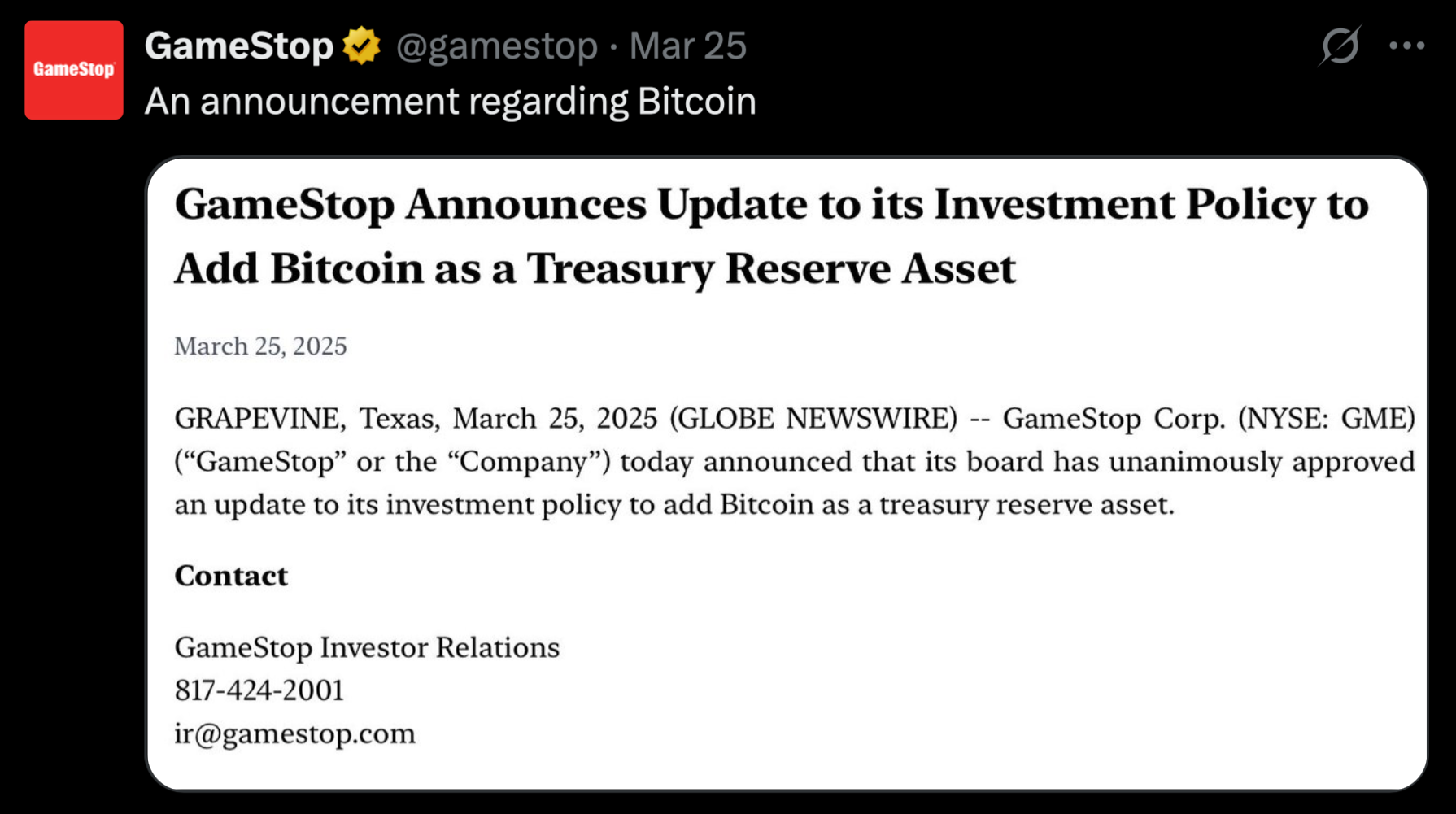
GameStop is following Strategy's playbook — the public software giant began buying BTC in 2020 and remains the largest corporate holder. As of this writing, Strategy the reserves amount to 528,185 BTC, worth just over $45 billion.
Earlier this year, GameStop CEO Ryan Cohen shared a photo of himself with Michael Saylor. Strategy's co-founder and Executive Chairman, Saylor is a vocal supporter of corporate Bitcoin treasury reserves.
The initial enthusiasm over GameStop's Bitcoin embrace caused the firm's stock price to rally last Wednesday, March 26. Yet not everyone is thrilled with the idea of raising additional debt to launch its crypto reserve. GME sank late last week following that announcement, and is still down over 20% over the past five days.



